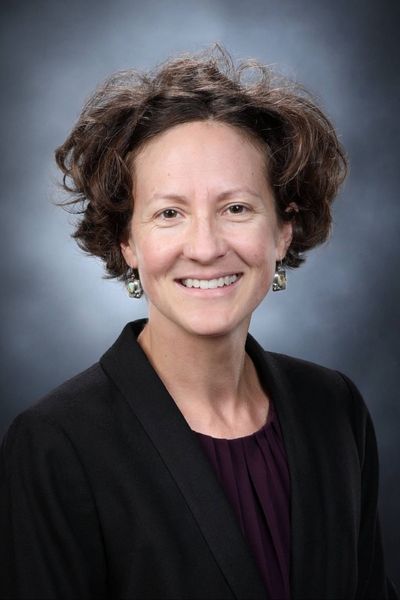Wayne State University College of Education awarded $50,000 to train current and future educators to implement disability-centered, culturally sustaining teaching practices

The Wayne State University College of Education received $50,000 from the Michigan Developmental Disabilities Institute (MI-DDI) to support the Disability-Centered Culturally Sustaining Pedagogies (DCCSPs) Project. Led by Amanda Miller, Ph.D., principal investigator, assistant professor of inclusive education in the Wayne State University College of Education, and a MI-DDI-affiliated research associate, the initiative seeks to reimagine the development of teacher candidates’ educational beliefs and practices by transforming their learning experiences amidst the pandemic.
“Teacher candidates need experiences that engage disability at the intersections of race, class, culture and language statuses because these identities exist in multiply marginalized students and families across PK-12 education. Multiply marginalized students and families are often positioned through deficit-layered lenses by educators and schools,” said Miller. “Our research team has developed meaningful and accessible virtual experiences for teacher candidates that center the voices, experiences, critical knowledge and expertise of disabled activists, poverty scholars and community scholars of color. We blend disability critical race studies and culturally sustaining pedagogies to prepare teacher candidates with accessible disability-centered culturally sustaining pedagogies.”
Saili Kulkarni, associate professor of special education at San José State University, and Emily Nusbaum, assistant adjunct professor at Mills College at Northeastern, are co-principal investigators. Other academicians and activists involved in the project include Lydia X.Z. Brown, advocate, organizer, attorney, strategist, and writer; Brianna Dickens, associate director of the Academic Success Center: Disability and Accessibility Services at Springfield College; Lisa “Tiny” Gray-Garcia, a formerly unhoused, incarcerated poverty scholar, revolutionary journalist, lecturer, poet, visionary, teacher, author, and co–founder of POOR Magazine/Prensa POBRE/Poor News Network; Keith Jones, president and CEO of SoulTouchin’ Experiences and a community activist with cerebral palsy; Leroy F. Moore, Jr., founder of the Krip-Hop Nation, one of the founding members of the National Black Disability Coalition, and an activist around police brutality against people with disabilities; and Holly Pearson, a deaf/hard-of-hearing Korean Adoptee female and visiting assistant professor in the sociology department at Framingham State University.
The project — which targets teacher candidates in general education, special education, curriculum and instruction, and bilingual education — was guided by three research questions: what are the initial beliefs and practices of teacher candidates that center/(de)center/(re)center disability, race, culture, language, and class? How do teacher candidates’ beliefs and practices shift/change during and after participating in a project focused on DCCSPs? What are the possibilities and constraints of a university-community partnership grounded in the lived experiences and expertise of disabled activists, poverty scholars and community scholars of color that attempts to contribute to equitable and just schooling experiences for multiply marginalized disabled youth?
Participants include teacher candidates from San José State University, Mills College at Northeastern and Wayne State University. The second cohort, which began during the winter 2021 semester, was funded by the Michigan Developmental Disabilities Institute (PRIME: Health Resources and Services Administration – US HRSA). The third cohort started in winter 2022 and was funded by the Michigan Developmental Disabilities Institute (Administration for Community Living – US HHS).
The Michigan Developmental Disabilities Institute is a University Center for Excellence in Developmental Disabilities (UCEDD). MI-DDI is part of a network of 67 UCEDDs in the U.S. and its territories. The institute's mission is to contribute to the development of inclusive communities and quality of life for people with disabilities and their families through a culturally sensitive, statewide program of training and education, community support and services, research and sharing of information.
Prior project participants mentor newer participants, cultivating project and pedagogy sustainability. Research shows that multiple cycles of reflection and feedback are essential for learning and application in teacher preparation. Inequitable educational opportunities and outcomes for multiply marginalized disabled youth present a pressing opportunity and timely necessity to prepare teacher candidates with DCCSPs for educational equity and justice. Investigators focus on participants from the metropolitan Detroit area and San Francisco Bay Area as contexts with heightened inequities for multiply marginalized disabled youth, their families and their communities.
Researchers hope to expand this project and partner with school districts in Oakland, Macomb and Wayne counties in Michigan and Alameda and Santa Clara counties in California. They also hope to include disabled youth of color as workshop facilitators and co-facilitators and plan to recruit teachers of color and teachers who identify as disabled for future cohorts.
“The goal of this project is to use a grow your own approach to creating sustainable, anti-ableist, and anti-racist PreK-12 educators,” said Miller. “We want to provide inclusive learning spaces in which all children feel safe and valued, and we are grateful to the MI-DDI for its support. We look forward to seeing the results of this work.”